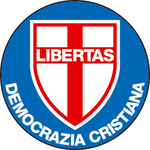- Christian Democracy (Italy, 1997)
-
Christian Democracy (Democrazia Cristiana, DC) is a minor christian democratic and strongly social-conservative Italian political party in Italy. The current leader of the party is Giuseppe Pizza.
The party proposed itself as the core of a refoundation of the original Christian Democracy and to effect the reunification of all the various christian-democratic parties in Italy. It was once part of the The Union centre-left coalition, but then distanced itself from it promoting an autonomous path and is now a minor ally of The People of Freedom.
Contents
History
The party was founded on 23 December 1997 as Rebirth of Christian Democracy (Rinascita della Democrazia Cristiana, RDC) by Flaminio Piccoli and Clelio Darida. In December 2001 it took the current name. In the 2001 general election the party sided with European Democracy of Sergio D'Antoni, while a splinter group led by Alfredo Vito, the Christian Democratic Party, formed an alliance with Forza Italia.
Between June 2002 and December 2003 the party was led by Angelo Sandri. In the 2004 European Parliament election, the party ran under the banner of New Country, winning only 0.2% of the vote. This alliance was not agreed by Sandri, who was ousted by new secretary Giuseppe Pizza in July 2004, leading him to launch his own "Christian Democracy", the so-called Party of Christian Democracy.
Since then there had been several disputes between Pizza and Sandri on the property of the name and the symbol, which was also claimed by the Union of Christian and Centre Democrats (UDC) and especially by Rocco Buttiglione, former leader of the United Christian Democrats, who used the symbol from 1995 to 2002, before passing it to UDC. However, in November 2006, a tribunal of Rome declared Pizza's Christian Democracy as the only legitimate heir of the historical DC. Anyway, also this ruling was contested both by Sandri and Buttiglione.
In the 2006 general election the party, which was not yet permitted to use the historical symbol of DC, formed an alliance with the Consumers' List within The Union. The alliance elected only a senator in Calabria, home-region of Giuseppe Pizza: Pietro Fuda, member of the Southern Democratic Party.
In September 2007, after a promising result in May provincial elections (everywhere around 1% and even 1.7% in Vicenza), began to unite under its banner several tiny centrist and christian-democratic parties, starting from Veneto for the EPP led by Giorgio Carollo. In October 2007, DC formed a federation with Veneto for the EPP and Liga Fronte Veneto, an independentist group emerged by a split of Liga VenetaLega Nord, but the alliance was soon disbanded.
In the 2008 general election the party supported The People of Freedom. The party was however excluded by the Ministry of the Interior from the electoral competition because of the similarity of its symbol with that of UDC, only to be re-introduced ten days before the election. Since the re-printing of the election ballots would have taken more than a week, Giuseppe Pizza decided not to take part to the election in order to avoid the postponement of the election.[1]
Soon after the election, which was convincingly won by the centre-right, Giuseppe Pizza was appointed Under-Secretary of Education, University and Research in Berlusconi IV Cabinet.
Leadership
- Secretary: Flaminio Piccoli (1997–2000), Carlo Senaldi (2000–2001), Alessandro Duce (2001–2002), Angelo Sandri (2002–2003), Giuseppe Pizza (2003–present)
- President: Clelio Darida (1997–2000), Angelo Sandri (2000–2002), Giuseppe Pizza (2002–2003), Angelo Sandri (2003–2004), Giuseppe Alessi (2004–2009), Alessandro Nasti (2009–present)
References
External links
Categories:- Political parties in Italy
- Political parties established in 2000
Wikimedia Foundation. 2010.

